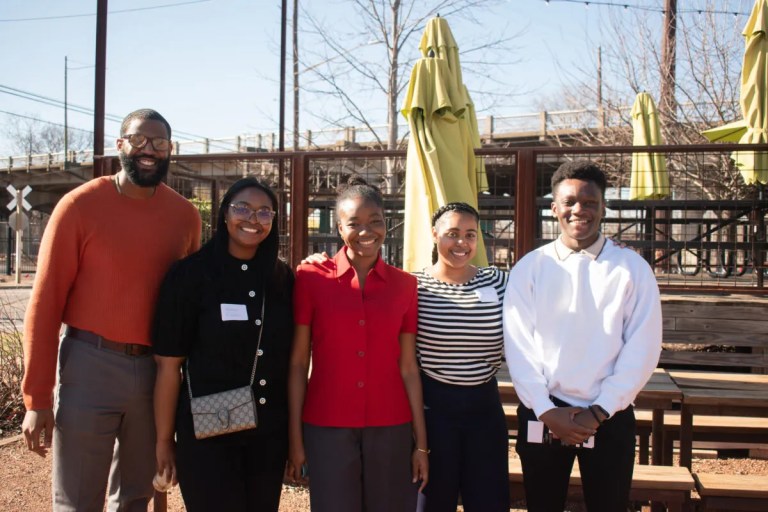Reviewed by: Cecilia Wood
Loved one struggling with substance use disorder? This local nonprofit is here to help.
Reading time: 5 minutes
Sponsored

Knowing the right path to follow can be tough for families who have loved ones struggling with substance use disorder. That’s where Addiction Prevention Coalition (APC) steps in with programs and resources designed specifically for families. Take a closer look at the positive impact of these services, plus meet one local family who has benefited from them.
But first, boost your knowledge about APC

APC is a local nonprofit community resource whose vision is to be a leader in addiction prevention by inspiring people to live with hope, resilience and purpose. One way they do this is by providing education and support programs designed to help families cope. They do this through:
- Online educational webinars and resources.
- In-person family support groups called Parents of Addicted Loved Ones (PAL).
Here’s a closer look.
1. PAL groups

PAL groups provide education and support to parents and families who have loved ones with a substance use disorder. These groups offer hope and understanding in a setting where everyone is walking similar paths.
Dave and Laura Urech joined a PAL group about four years ago to help them cope with having an addicted son.
“The extent of resources APC provides as well as their knowledge and connections in addiction stood out to us. Seeing and taking part in activities that you can see helping others more effectively deal with such painful challenges, and getting support from others is very rewarding.”
Dave Urech, group leader, PAL
After two years of participating in the PAL group, Dave and Laura began facilitating a group in Shelby County—which they still lead today.
PAL groups take place once a week on Monday or Thursday at 6:30PM. For more information on PAL groups, contact Art Wimberly, Recovery Coach at 205.616.8867.
2. Why Won’t They Stop? series

In 2021, APC partnered with fellow family support organizations to create another family education series called Why Won’t They Stop?, or WWTS? The webinar series features monthly webinars on important topics led by the family support organizations involved in the project. Along with APC, these organizations include:
- UAB Addiction Recovery
- UAB Beacon Recovery
- Birmingham Recovery Center
- Drug Education Council of Mobile
- Not One More Alabama in Huntsville
If you’d like to participate in the WWTS? Take part in the next event:
What: WWTS? Smokescreen: Vaping & Addiction. Discussion with the Drug Education Council of Mobile. Will focus on the dangers of vaping addiction, plus latest information on current trends in the electronic cigarette epidemic.
When: June 29
Where: Online
Cost: Free
Sign up for more upcoming WWTS? events on Eventbrite or follow APC on Facebook.
3. Community Reinforcement Approach and Family Training (CRAFT)

One of the goals of creating the WWTS? series was to bring Community Reinforcement Approach and Family Training (CRAFT) to Birmingham. The scientifically-based intervention was designed to help concerned significant others (CSOs) to engage positively with loved ones struggling with substance use.
This new intervention method was developed with the belief that since family members can, and do make important contributions in other areas of addiction treatment (i.e. family and couples therapy), the CSO can play a powerful role in helping to engage the substance user in positive ways.
According to APC, CSOs who attend the CRAFT program see many benefits by becoming more independent and reducing their depression, anxiety and anger symptoms even if their loved one does not enter treatment.
“As facilitators of a Parents of Addicts meeting, we are using the CRAFT materials and related videos in our group meetings. We also use the various videos and resources they offer.”
Dave Urech, group leader, PAL
Currently, there are three in-person and two virtual CRAFT groups learning this new material. All groups are open to the public.
Should you take part in APC’s programs?

According to Dave, the answer is yes.
“Any parent or spouse dealing with an addicted loved one, or a professional in the field would gain so much valuable education, resources and connections that would greatly improve their knowledge and effectiveness to deal with it.”
Dave Urech, group leader, PAL
For more information about these groups, contact APC’s Executive Director Carie Wimberly via email or call 205.874.8498.
Discover more ways APC has helped the Birmingham community:
- Find out how this new initiative with Addiction Prevention Coalition is helping stop HIV in Birmingham’s youth
- Birmingham’s youth pave the way to a world without substance misuse and addiction—here’s how
- Meet the 2022 Champion for the Cause + stamp out substance use disorder—register now for the Addiction BHAM Walk, March 12
To learn more about APC and the many ways they are helping fight addiction in Birmingham, visit their website and follow them on Facebook and Instagram.
Sponsored by:



